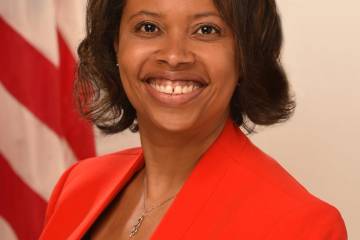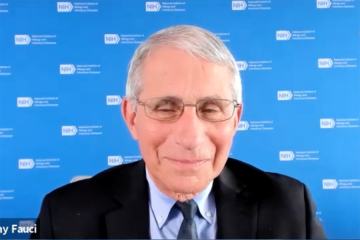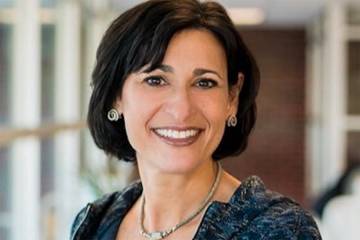Donna Shalala's storied career began in the Peace Corps, where she was one of the first American volunteers to join the organization. Of Lebanese descent, Shalala requested to be stationed in the Middle East, volunteering building an agricultural college in Iran.
The experience was formative and set her on her path to becoming a longtime public servant and advocate for others.
"First, I learned how to be fearless," she said during a virtual discussion hosted by Johns Hopkins on Wednesday. "Second, I really learned about poverty. … Frankly, I became a citizen of the world."
Shalala is the nation's longest-tenured secretary of Health and Human Services, having served for eight years during the Clinton Administration, from 1993 to 2001. She is currently the Trustee Professor of Political Science and Health Policy at the University of Miami. She has also served as U.S. representative for Florida's 27th Congressional District, president of the University of Miami and Hunter College, chancellor of the University of Wisconsin-Madison, and president and CEO of the Clinton Foundation, among other prominent roles.
She spoke Wednesday as part of the Johns Hopkins Health Policy Forum, which engages key leaders on matters of health policy and health care in conversations with members of the university community.
Shalala, whom The Washington Post called one of the most successful government managers of modern times, shared some of the secrets to her success during her talk, which was moderated by Johns Hopkins Health System President Kevin Sowers. She credited her ability to manage large and powerful individuals—leaders of government organizations, secretaries of federal services, managers of government budgets—to time she spent working at universities, but also the time she spent in the Peace Corps learning about different cultures.
"I had an ability, because I had been in research universities, to conceptualize the management of strong personalities, and learn how to weave them together with both the policymaking process as well as the budget process," she said. "Teams are very important in leading complex institutions."
Through strategic partnerships, teamwork, and collaboration, Shalala said, she was able to lead vital public health responses during her time at HHS.
"I had the great honor of working with [Director of the National Institute of Allergy and Infectious Diseases Anthony] Fauci on the AIDS crisis," Shalala said. "At the beginning, everybody was dying. By the time we left, we had treatments for people around the world."
But frequently, in the realm of health policy, making a difference also requires reaching across the aisle and working alongside policymakers with different or opposing views. That was the case, Shalala said, of the work she did to boost immunizations for American children. Being open to new ideas while remaining focused on the big picture issues, Shalala said, was key.
"To get anything done, we had to do lots of bipartisan [deals]. We only had half the kids in the country immunized by the time they were 3. That was a huge challenge that we took on. And we got basically 90% of them immunized," she said.
It's also vital, Shalala said, to facilitate idea-sharing among a team, because sometimes small ideas can change—or save—lives. After sending out an open call for ideas for public health interventions, she was approached by a group of researchers from the National Institutes of Health with a small study that found that putting infants on their backs could reduce the risk of sudden infant death syndrome, or SIDS. Shalala helped launched the national Back to Sleep campaign, imploring pediatricians to recommend back-sleeping for infants and working with diaper manufacturers to create "this side up" slogans on diapers.
Back to Sleep was hugely successful, Shalala said, reducing SIDS in the United States by at least 70%. And it began with a small piece of research, presented by a small group of researchers.
To protect the future of American health, Shalala said, we must make room for more partnerships. Health systems should partner with public health departments, health departments should partner with members of the community, doctors should more closely partner with nurses. It's through partnership and teamwork that American health will be protected during future crises.
The Health Policy Forum series is jointly hosted by Johns Hopkins University's Bloomberg School of Public Health, Carey Business School, and School of Nursing along with Johns Hopkins Medicine. Past speakers have included Anthony Fauci; Rochelle P. Walensky, director of the U.S. Centers for Disease Control and Prevention; and Chiquita Brooks-LaSure, administrator of the Centers for Medicare and Medicaid Services, among others.
Posted in Health, Voices+Opinion










